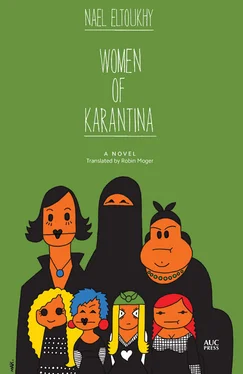Hagga Itemad knew Sheikh Hassan. Distantly, as she put it. He was the one who advised her to speak to Inji when she complained to him about her daughter’s English grades. The first time Inji visited her at home, the hagga made her mulukhiya with chicken and stuffed vine leaves, and vowed by all that was holy that Inji would eat with them. Inji could not refuse. She didn’t speak a lot at first. Gradually her appetite grew, for talk and food, and the hagga nudged her shoulder. Relax my dear, she said, and brought a drumstick up to her mouth: Come on now. Eat that.
Inji didn’t tutor the girl that first time. Didn’t see her at all. She ate and ate and ate. At last she found herself sitting alone with Hagga Itemad in the living room, the hagga — legs stretched out on the floor, head resting on the armchair — in her nightgown, her arms formidable, her chest tremendous and whitest white. The contrast between the white of her bosom and her brown neck seemed absurd to Inji. Inji propped herself against the couch facing the hagga and pressed her knees to her breasts. The hagga rolled a joint and handed it over and Inji smoked and stared at the buzzing fan.
The pair of them were out of it. After a bit, the hagga turned to her. Inshi, my girl. Slowly Inji looks round. The hagga goes on: You killed someone in Cairo, didn’t you, my dear?
The narrow circle in which Ali and Inji moved knew the story of Ramses Station. The murder tale. With a few embellishments: the accident became deliberate homicide and Ali and Inji were killers with no one to take them in. And yet it was precisely this that caused them all to rally round, including the two examples now before us: Abu Amira’s family and Hagga Itemad. They had a general and nebulous outline, but the details were sorely lacking. Perhaps it was for this reason that Hagga Itemad called on Sheikh Hassan with her daughter as a pretext. We can conceive of the people of Alexandria as a vast gang, stupendously vast, a gang that is always striving to recruit new and powerful and important members to its ranks. And by the people of Alexandria we mean Abu Amira’s family and Hagga Itemad.
This generalization is a touch misleading, true, but life is impossible without generalizations.
It is extremely difficult to pinpoint Inji’s reaction to the hagga’s question, but we have clues to work with. Subsequently, when she told Ali what had happened, she would say, I didn’t know what to tell her. I felt everybody could see me. And then I found myself laughing and saying, Yeah, I killed someone and anyone else speaks out of turn to me, I’ll kill them too.
Where did Inji get such strength from?
Life in Alexandria teaches many things. Very many things indeed.
Life in Alexandria has no time for feelings.
Hagga Itemad broke down Inji’s walls. In the hagga she found someone to be close to, away from the store and home. And for her part, the hagga was lovable, a businesswoman born and bred, who treated each and every person as they wanted to be treated. She knew everyone and everyone knew her and she made sure that everyone knew everyone else. Inji loved her and the hagga in turn never held back any advice the girl might need, whether it concerned pregnancy, life in Alexandria, life on the run from the police, or life on the run from guilt.
The last point’s an important one. The hagga suggested they pray together in the mosque. She suggested she put on the hijab. You think the hijab will make you ugly, but you’re a fool. My girl, you’ll be a picture. And Inji put on the hijab and took to reading the Quran daily. She cheered up, and at long last her heart opened to her surroundings. She permitted Ali to invite Sousou round and she cooked for them. And then, one by one, all the members of the Amira clan dropped by: Umm Amira, Abu Amira, and finally, Adel.
The thaw had set in at last.
Inji tutored the hagga’s daughter Minnatallah every day. A bright girl, but pig-ignorant at the same time. True, she got the hang of things quickly enough, but she knew zero English. So Inji had to start from scratch. Minna, stick your tongue out when you say th. Minna, there’s no such thing as he walk. It’s he walks or he is walking. Minna, there’s a difference between b and p. Minna, will you concentrate, please, and stop gaping at the ceiling.
But Minna was bright. She picked up words in English in a flash, in Inji’s American accent, and could repeat them back. Not well enough to hold a conversation, of course, but enough to pass the exam. Day after day Inji would enter their home life, would see it from within. A simple home for simple people. Not rolling around in money, sure, not speaking foreign languages all the time, it’s true, but they had something straightforward about them, something intimate and honest. Inji had always felt this kind of honesty was the hallmark of the bona fide common man, and she saw it embodied in the hagga’s family.
But where was the hagga’s husband? The question revolved continuously round Inji’s mind, with no answer forthcoming, and she had been too shy to ask. She’d been frightened. Minna had once mentioned something about Daddy the heroic martyr and something, too, about Sheikh Hassan, who ensured they never wanted for anything. Minna said no more and Inji didn’t ask.
The hagga did not question Inji about the murder again. It seemed that she was trying to piece together the details of the incident through her own private channels. She never despaired. She collected fact after fact until she’d put together a bulging file. This file did not make an appearance just then. It would have its day. Hagga Itemad left nothing to chance.
Ali’s affair with Umm Amira continued in his apartment. She talked a lot, was always talking. She told him every little thing about everybody. Under him, on top, beside him, and behind him, she would tell him every little thing about every single person, and Ali heard nothing. Quite the opposite was true of Abu Amira, aglow with some tremendous energy, which had been evident from the first and was only growing stronger with time. Ali tried talking to him, tried proving himself before him, but subsequently he was content just to watch him. He watched him as he lit cigarettes, as he stared into the distance, as he sipped his tea, tied his laces, slipped money from his wallet, as he pissed into the cafe’s urinal. Abu Amira’s every movement seemed freighted with some special philosophy. He said little but Ali hung on his every word. There was much he didn’t understand. He was young, and back then he had yet to come to terms with life. The Fates had appointed Abu Amira to teach Ali everything.
For days at a time Ali was silent. And Abu Amira shared his silence, lighting a cigarette and giving him a drag, drinking tea and giving him a sip, scratching his balls and looking at Ali and laughing and, suddenly, speaking. He said: Things aren’t like they were. There’s no good in the world. And Ali stored this sentence in his head and stored the winks and nods that preceded it and came after. Only in this way did Ali become an adult.
We cannot say for certain just when it was that the prospective friendship between Ali and Abu Amira metamorphosed into a relationship of a different kind: an apprenticeship; adoption, adoration. . something like that. Ultimately, all we can do is relate a seminal circumstance in this transformation. We all remember that Ali had slept with Umm Amira about five times, and these five times had given him the idea that he could take liberties with Abu Amira.
They are playing backgammon at a neighborhood café. The game’s outcome is more or less a given now. Abu Amira will take it. But Ali seeks vengeance for his slighted dignity. He narrows his eyes and says, Okay then, friend, but I’ve got you beat in something much better than backgammon. Abu Amira smiles. He shuts the board. He orders tea for Mr. Ali. Crosses his legs. Scratches his mustache and plucks out a long black hair dangling from his nose. He looks at Ali. His voice changes. It becomes charming, smiling, indulgent. Beautiful. And just who, my dear Ali, has really got the better of the other? You, is it? Fine, you’re quite right. But which time do you mean?
Читать дальше












